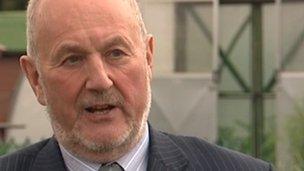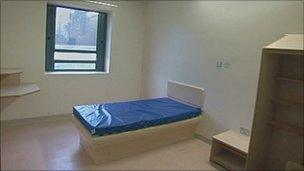Rare glimpse inside Rampton Hospital
- Published
Extensive grounds, a swimming pool and a full Sky Sports package are facilities usually found at a five-star hotel, not a high-security hospital.
While some patients at Rampton Hospital in Nottinghamshire are among the most dangerous criminals in the UK, chief executive Dr Mike Harris says others are their for their own safety.
The hospital's alumni includes child killer Beverly Allitt and Soham murderer Ian Huntley but staff are passionate about helping patients rebuild their lives.
A BBC Inside Out documentary, in which camera crews were allowed into the hospital for the first time in 18 years, gives a glimpse of life at Rampton.
"My number one priority is to safeguard the public but if this was my child in this hospital, I'd want them to receive the very best treatment and appropriate accommodation. That's the standard I set myself and the staff," said Mr Harris.
'Not a monster'
He is keen to stress Rampton is a hospital, not a prison as often perceived by those on the outside. Many of the 326 patients have committed extremely violent crimes but some have been admitted to prevent them from harming themselves.

Dr Mike Harris believes patients should be treated humanely
Bill - not his real name - was a patient at Rampton for many years but with the appropriate treatment, he has been able to put his violent past behind him and is now studying for a fine arts degree.
"I got arrested for stabbing someone, it was quite an horrific offence," he said.
"I stabbed them quite a lot of times, bit them, slashed them and put their head through a window."
When asked by the programme makers if he considered himself to have been a "monster" at the time, he replied: "I was an animal but not a monster."
He added: "This place worked for me and there are some bloody good staff there."
More than 2,000 staff look after the 326 patients at a cost of £100m a year.
Dismissing suggestions that Rampton is an "easy option" for violent offenders, Dr Harris said: "It's a philosophical question whether you want to treat people humanely or not.
"The vast majority of our patients have had really poor deals in life.
"One in four of the population has a mental health problem at some point in their life, it is terribly common. The people in the hospital are somebody's children or parents or brother or sister.
"I don't know what necessarily causes people to end up in a hospital like this but it could happen to any of us or our families. That's why you don't lock them up and throw away the key."
Mass murderers
On the flipside to the "holiday camp" allegations is a £25m security system, including a system of 900 CCTV cameras.
"Gary", a current patient at Rampton, said he was quite frightened when he first arrived.

The rooms in the Peaks Unit are sparse and "suicide safe"
"There are people who have been in here for mass murder and it's scary to think you are going to be in the same place as someone like that," he said.
The hospital includes The Peaks Unit for men with severe personality disorders. The rooms are sparse and "suicide safe" with mattresses made from tough material which is tear, rip and heat resistant. The bed frames are made from moulded glass fibre and are designed to withstand damage but also provide a good night's sleep.
The average stay for a patient at Rampton is now eight years but in a reminder of methods of treatment in previous eras, people who spent their whole lives under lock and key are buried in the hospital's graveyard.
But for staff at Rampton, a healthy life on the outside is the main goal for their patients.
"I believe by treating people humanely, you will get them to behave in different ways," said Dr Harris.
Inside Out East Midlands will be broadcast on BBC One at 19:30 GMT on Monday 28 November.